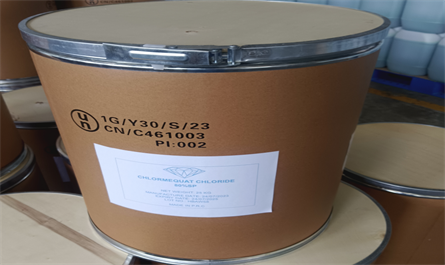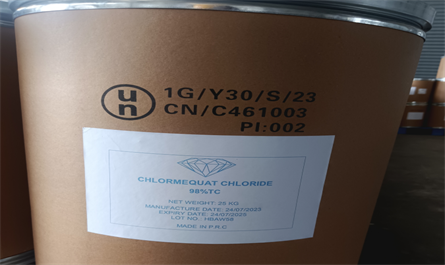Chlormequat chloride shipping to customer


Chlormequat chloride is an excellent plant growth regulator, also known as chlormequat chloride. Can be used in wheat; Rice; Cotton; Tobacco; Corn and tomatoes and other crops, inhibit crop cell elongation, but do not inhibit cell division, can make plants shorter, stem thicker, leaf color green, can make crops drought and flood tolerance, prevent crops from growing and lodging, salt and alkali resistance, but also to prevent cotton drop, can make potato tubers increase.
Chlormequat chloride's physiological function is to control the vegetal growth of plants (that is, the growth of roots and leaves), promote the reproductive growth of plants (that is, the growth of flowers and fruits), shorten the internode of plants, and resist falling, promote the color of leaves, strengthen photosynthesis, and improve the fruit setting rate, drought resistance, cold resistance and saline-alkali resistance of plants.
Chlormequat chloride has a controlling effect on crop growth, which can prevent seedling collapse, control growth and tillering, prevent plant from falling, increase spike and increase yield.
After use, the plants are dwarfed and the stems are stout, which can prevent the plants from growing and lodging, make the leaves dark green, the leaves are thickened, the chlorophyll content is increased, and the roots are developed. Chlormequat chloride inhibits the biosynthesis of endogenous gibberellin, thus slowing cell elongation and dwarfing plants. The inhibitory effect of Chlormequat chloride on internode elongation can be relieved by external application of gibberellin. Chlormequat chloride enhances the ability of roots to absorb water, significantly affects the accumulation of proline (which stabilizes cell membranes), and enhances the resistance of plants to drought, cold, salt and alkali, and disease. Chlormequat chloride treatment reduces the number of stomata in leaves, reduces transpiration rate, and increases drought resistance. Chlormequat chloride is easily degraded by enzymes and is not easily fixed by the soil, so chlormequat chloride does not affect the activity of soil microorganisms or can be decomposed by microorganisms.
Chlormequat chloride has a controlling effect on crop growth, which can prevent seedling collapse, control growth and tillering, prevent plant from falling, increase spike and increase yield.
RECENT POSTS
-
What measures should be taken to help crops recover after heavy snowfall and a drop in temperature?
-
4000KG Sodium Nitrophenolates (Atonik) ready to shipping
-
Sodium Para-Nitrophenolate 10800KG shipping to customer
-
The global plant growth regulator market is experiencing steady expansion with growth expected to exceed the average growth rate of the pesticide industry
Featured News



